- Skip to primary navigation
- Skip to main content
- Skip to primary sidebar
- Skip to footer
Don't Miss a Post! Subscribe

- Book Summaries
- Books for Teachers
- Research Methodology Books
- Themed Book Lists
- Beyond Books

Selected Reads
A blog for bibliophiles covering everything related to books from reviews and summaries to quotes and open articles.

Best Books on Writing Research and Dissertation Proposals
By Med Kharbach, PhD | Published: May 17, 2023 | Updated: June 3, 2024
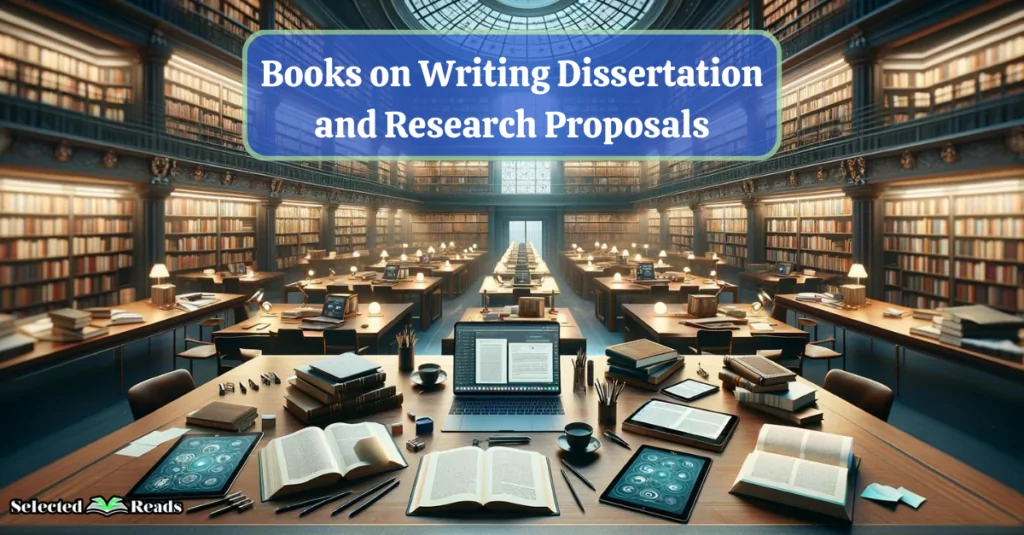
As an educator and budding researcher, I’ve trodden the path of academic writing more times than I can count. From my nascent days as a doctoral student to my current role guiding others through their research journeys, I’ve penned dissertations, research papers, grants, research proposals, and more – each with its unique challenges and rewarding moments of breakthrough.
Taking the first steps into writing a research or dissertation proposal can seem like standing at the foot of an imposing mountain. The steep climb ahead, adorned with the rigors of extensive reading, nuanced academic writing, and a commitment level that would put marathon runners to shame, can be intimidating, to say the least.
Fear not, though. This journey, while rigorous, isn’t one you have to embark on unprepared or alone. I’ve discovered, through years of experience, that the secret to transforming this daunting task into a manageable one lies in the art of breaking it down.
Consider your research proposal or dissertation as a puzzle, with each section – the introduction, literature review, aims and objectives, methodology, ethical considerations, and so on – a piece of the larger picture. Focusing on one piece at a time, treating each as an individual project, can turn an overwhelming mountain into a series of small, conquerable hills.
Related: Best books on how to write a dissertation
A word to the wise: you might find it helpful to leave the crafting of the introduction until after you’ve completed the other sections. This way, you have a complete understanding of your research landscape, making it easier to introduce your work compellingly.
Let’s be candid: embarking on your first research or dissertation proposal may stir feelings of frustration, procrastination, and even imposter syndrome. These are not anomalies, but rather, common companions on the academic journey. The good news is, over time, you’ll learn to navigate these challenges with increasing dexterity. They may never disappear entirely, but believe me, you’ll become an expert in outsmarting them.
Related: Books on how to write a literature review
With this in mind, my intention for this blog post is to offer a lifeline in the form of practical, tried-and-true books that have aided me throughout my academic voyage. Check them out below and share with us your feedback!
Books on Writing Research and Dissertation Proposals
Here are some very good books to help you learn to write dissertation and research proposals:
1. Writing Successful Science Proposals , by Andrew J. Friedland, Carol L Folt, Jennifer L. Mercer
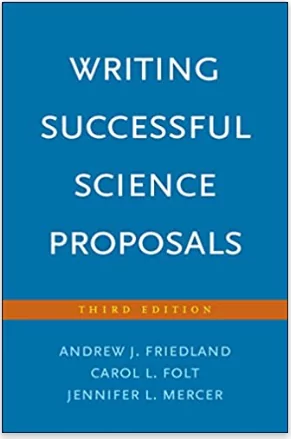
“Writing Successful Science Proposals” by Andrew J. Friedland, Carol L Folt, and Jennifer L. Mercer is a comprehensive guide brimming with professional insights for navigating the proposal writing process. The authors break down every step of proposal writing in an accessible manner, detailing everything from conceptualizing and designing a project to analyzing data, synthesizing results, estimating a budget, responding to reviewer comments, and even resubmitting.
3. Research Proposals: A Practical Guide , by Martyn Denscombe
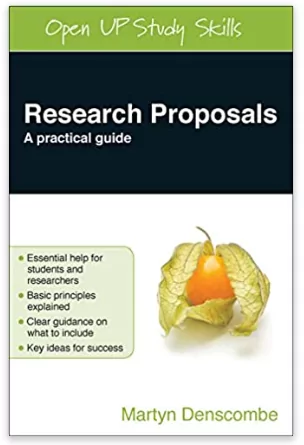
“Research Proposals: A Practical Guide” by Martyn Denscombe is a comprehensive manual guiding readers through the crucial stages of crafting a research proposal – from selecting a topic to the final write-up. It’s a step-by-step companion that transforms the intimidating task of proposal writing into a manageable and organized process.
4. Writing a Proposal for Your Dissertation: Guidelines and Examples , by Steven R. Terrell
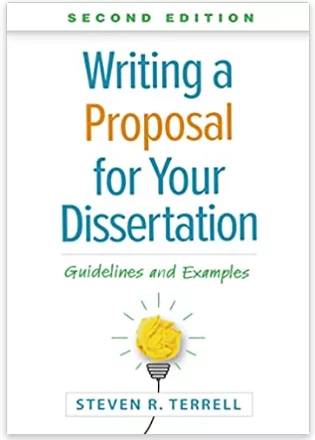
Steven R. Terrell’s “Writing a Proposal for Your Dissertation: Guidelines and Examples” offers indispensable guidance for each component of your dissertation proposal. From crafting compelling problem statements, purpose statements, research questions and hypotheses, to conducting literature reviews and laying out detailed data collection and analysis plans, Terrell has you covered. The book is enriched with case studies from diverse disciplines, interactive checklists, end-of-chapter quizzes, and exemplary proposals illustrating different research approaches.
5. Grant Writer’s Handbook: How To Write A Research Proposal And Succeed , by Gerard M Crawley
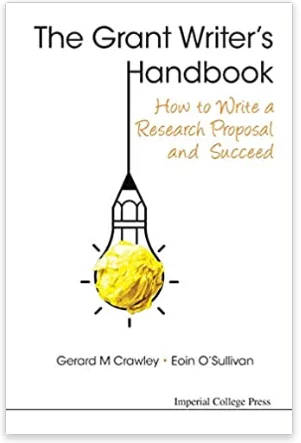
“Grant Writer’s Handbook: How To Write A Research Proposal And Succeed” by Gerard M Crawley is a comprehensive guide that offers invaluable advice on all aspects of proposal writing, including idea development, proposal drafting, referee interaction, and budgeting. The authors leverage their extensive experience in writing and reviewing proposals from various countries and scientific maturity levels, making this handbook globally relevant.
6. Research Proposal: Little Quick Fix , by Zina O′Leary
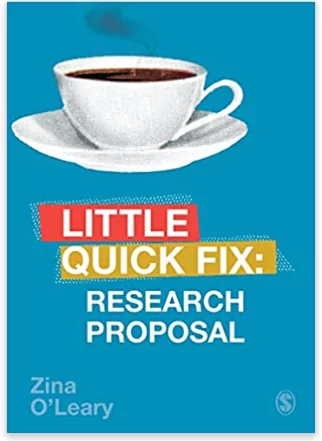
Zina O′Leary′s “Research Proposal: Little Quick Fix” is a smart, engaging workbook filled with real-life examples that keep you on track. This invaluable resource guides you through the elements of a proposal and helps you craft your unique research proposal quickly and effectively, using insightful exercises.
7. Designing Your First Research Proposal , by Renuka Vithal, Jonathan Jansen
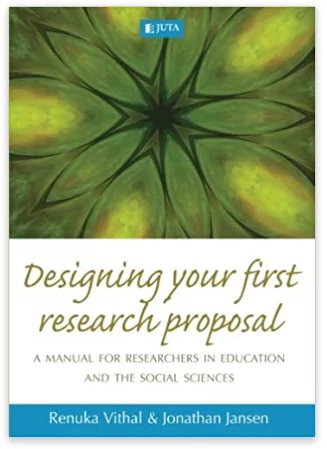
“Designing Your First Research Proposal: A Manual for Researchers in Education and the Social Sciences” by Renuka Vithal and Jonathan Jansen presents a clear and coherent strategy for creating a research proposal suitable for various disciplines. This updated manual offers step-by-step instructions on writing proposals for both basic and advanced research projects.
8. Proposal Planning & Writing , by Miner
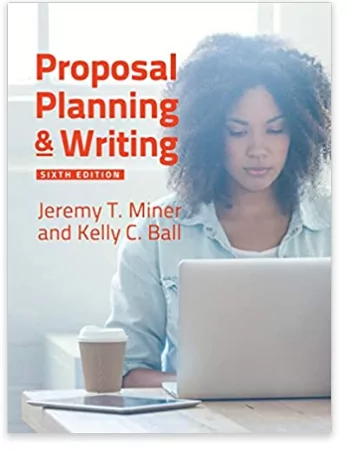
“Proposal Planning & Writing” by Miner draws on the authors’ extensive grantseeking experience to deliver a guide for creating successful proposals. From strategic project planning to targeted proposal writing, the authors provide a systematic approach, introducing a template for writing letter proposals and offering tips for crafting a realistic budget.
9. Grant Writing: The Complete Workbook for Writing Grant Proposals that Win , by Mary Gladstone-Highland
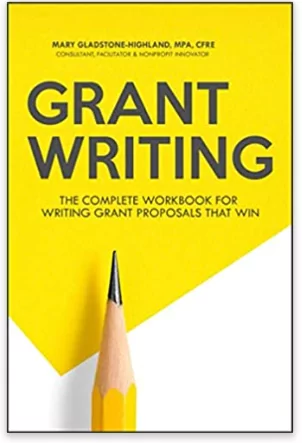
“Grant Writing: The Complete Workbook for Writing Grant Proposals that Win” by Mary Gladstone-Highland addresses the essential questions that arise during the grant writing process. It guides you from project planning to application writing, providing clear, comprehensive answers and helping you weave a compelling narrative and craft a convincing budget.
10. How to Design, Write, and Present a Successful Dissertation Proposal, by Elizabeth A. Wentz
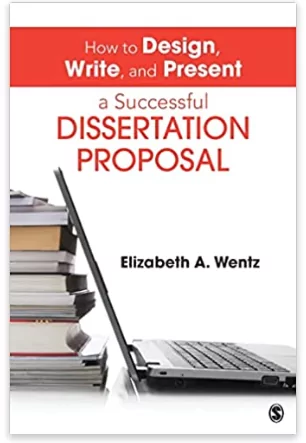
Elizabeth A. Wentz’s “How to Design, Write, and Present a Successful Dissertation Proposal” is an indispensable resource for any graduate student in the social or behavioral sciences. The book underscores the importance of ethical research, CV development, effective reading and writing skills, literature review completion, and the translation of a research idea into a viable proposal using research methods.
Final thoughts
Wrapping up this journey through the landscape of academic writing, especially the crafting of research and dissertation proposals, I would like to reiterate that the books I shared above are more than just guides, they’re companions for the trek, offering insights gleaned from years of experience, trial, and error. They stand as beacons, illuminating the often murky process of turning a complex research idea into a coherent and compelling proposal.
I encourage you, whether you’re setting out on your first research proposal or looking to refine your approach, to dive into these texts. And keep in mind that the mountain of academic writing is not insurmountable. With the right tools, a bit of perseverance, and a willingness to learn, you’ll find that what once seemed like an imposing peak becomes a series of manageable steps.
Related Posts
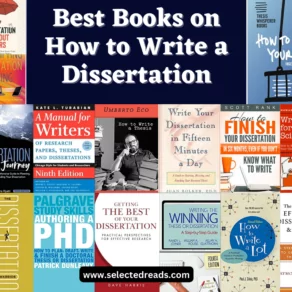
Meet Med Kharbach, PhD
Dr. Med Kharbach is an influential voice in the global educational landscape, with an extensive background in educational studies and a decade-long experience as a K-12 teacher. Holding a Ph.D. from Mount Saint Vincent University in Halifax, Canada, he brings a unique perspective to the educational world by integrating his profound academic knowledge with his hands-on teaching experience. Dr. Kharbach's academic pursuits encompass curriculum studies, discourse analysis, language learning/teaching, language and identity, emerging literacies, educational technology, and research methodologies. His work has been presented at numerous national and international conferences and published in various esteemed academic journals.
Join our mailing list
Subscribe to our email list for bite-sized book summaries, curated recommendations, and exclusive content.
You have successfully joined our subscriber list.
5 books to help you with your PhD
There’s so many, many books on the market that claim to help you with your PhD – which ones are worth buying? I have been thinking about it this topic for some time, but it’s still hard to decide. So here’s a provisional top 5, based on books I use again and again in my PhD workshops:

I wish I owned the copyright to this one because I am sure they sell a shed load every year. Although it seems to be written for undergraduates, PhD students like it for its straight forward, unfussy style. Just about every aspect of research is covered: from considering your audience to planning and writing a paper (or thesis). The section on asking research questions is an excellent walk through of epistemology: an area many people find conceptually difficult. I find it speaks to both science and non science people, but, like all books I have encountered in the ‘self help’ PhD genre, The Craft of Research does have a bias towards ‘traditional’ forms of research practice. You creative researcher types might like to buy it anyway, if only to help you know what you are departing from.
2. How to write a better thesis by Paul Gruba and David Evans
This was the first book I ever bought on the subject, which probably accounts for my fondness for it. I have recommended it to countless students over the 6 or so years I have been Thesis Whispering, many of whom write to thank me. The appealing thing about this book is that it doesn’t try to do too much. It sticks to the mechanics of writing a basic introduction> literature review> methods> results> conclusion style thesis, but I used it to write a project based creative research thesis when I did my masters and found the advice was still valid. Oh – and the price point is not bad either. If you can only afford one book on the list I would get this one.
3. Helping Doctoral Students to write by Barbara Kamler and Pat Thomson
I won an award for my thesis and this book is why. In Helping doctoral students to write Kamler and Thomson explain the concept of ‘scholarly grammar’, providing plenty of before and after examples which even the grammar disabled like myself can understand. I constantly recommend this book to students, but I find that one has to be at a certain stage in the PhD process to really hear what it has to say. I’m not sure why this is, but if you have been getting frustratingly vague feedback from your supervisors – who are unhappy but can’t quite tell you why – you probably need to read this book. It is written for social science students, so scientists might be put off by the style – but please don’t let that stop you from giving it a go. Physicists and engineers have told me they loved the book too. If you want a bit more of the conceptual basis behind the book, read this earlier post on why a thesis is a bit like an avatar.
4. The unwritten rules of PhD research by Marian Petre and Gordon Rugg
I love this book because it recognises the social complexities of doing a PhD, without ever becoming maudlin. Indeed it’s genuinely funny in parts, which makes it a pleasure to read. The authors are at their best when explaining how academia works, such as the concept of ‘sharks in the water’ (the feeding frenzy sometimes witnessed in presentations when students make a mistake and are jumped on by senior academics) and the typology of supervisors. It’s also one of the better references I have found on writing conference papers.
5. 265 trouble shooting strategies for writing non fiction Barbara Fine Clouse
This book is great because it doesn’t try to teach you how to write – you already know how to do that. What you need more is something to help you tweak your writing and improve it. This book is basically a big list of strategies you might like to try when you are stuck, or bored with the way you are writing. This book is so useful I have literally loved it to death – the spine is hopelessly broken and pages are held in by sticky tape. There are many wonderful tips in here from ‘free writing’ and ‘write it backwards’ ideas, to diagramming methods and analytical tools. Opening it at almost any page will give you an idea of something new to try.
What books would be on your top 5 list and why?
Share this:
The Thesis Whisperer is written by Professor Inger Mewburn, director of researcher development at The Australian National University . New posts on the first Wednesday of the month. Subscribe by email below. Visit the About page to find out more about me, my podcasts and books. I'm on most social media platforms as @thesiswhisperer. The best places to talk to me are LinkedIn , Mastodon and Threads.
- Post (611)
- Page (16)
- Product (6)
- Getting things done (261)
- Miscellany (139)
- On Writing (139)
- Your Career (113)
- You and your supervisor (66)
- Writing (48)
- productivity (23)
- consulting (13)
- TWC (13)
- supervision (12)
- 2024 (10)
- 2023 (12)
- 2022 (11)
- 2021 (15)
- 2020 (22)
Whisper to me....
Enter your email address to get posts by email.
Email Address
Sign me up!
- On the reg: a podcast with @jasondowns
- Thesis Whisperer on Facebook
- Thesis Whisperer on Instagram
- Thesis Whisperer on Soundcloud
- Thesis Whisperer on Youtube
- Thesiswhisperer on Mastodon
- Thesiswhisperer page on LinkedIn
- Thesiswhisperer Podcast
- 12,334,720 hits
Discover more from The Thesis Whisperer
Subscribe now to keep reading and get access to the full archive.
Type your email…
Continue reading
5 Best Books On Thesis Writing

Tired of feeling like Frodo on a journey to Mordor when it comes to thesis writing? The right books on thesis writing can be your Gandalf. For first-time thesis writers or seasoned researchers, the right resources will make it easier.
In this post, we’ll explore the 5 best books on thesis writing that can make your academic journey more manageable and maybe even enjoyable.
Why Do You Need The Best Books On Thesis Writing?
Writing a thesis is like building a complex Lego set without instructions. You can wing it but having a guide saves time and stress. The best books on thesis writing not only give you a clear map but also teach you how to present your ideas persuasively.
Whether you’re in the sciences, humanities or engineering these books help you adapt to your field. They also cover research methodology and academic presentation so they’re a must have.

1. “How to Write a Better Thesis” by David Evans, Paul Gruba, and Justin Zobel
This classic is like a Swiss Army knife for thesis writing. It’s concise, practical, and user-friendly. The authors guide you through the essentials of crafting a thesis, from defining your research question to polishing your final draft.
What makes it special?
- Focuses on problem-solving techniques.
- Provides practical exercises to refine your arguments.
Best for: Beginners and students who feel overwhelmed by the process.
2. “Writing Your Thesis” by Paul Oliver
Paul Oliver’s book is like having a mentor in print. It combines theoretical frameworks with actionable advice, making it a balanced resource for tackling both the technical and creative aspects of thesis writing.
Highlights:
- Case studies that demonstrate successful thesis writing strategies.
- Tips for overcoming writer’s block and staying organized.
Best for: Students looking for a mix of theory and practice.
3. “The Craft of Research” by Wayne C. Booth, Gregory G. Colomb, and Joseph M. Williams
If your thesis feels like an endless puzzle, this book is your cheat sheet. It’s not just about writing—it’s about thinking critically and crafting a well-structured argument.
Key features:
- Breaks down the research process into manageable steps.
- Emphasizes the importance of storytelling in academic writing.
Best for: Researchers in fields requiring extensive data and analysis.
4. “Mapping Your Thesis” by Barry White
Barry White takes a deep dive into the relationship between research, titles, and arguments. Though dense, it’s a treasure trove of advice for those willing to dig in.
Why it stands out:
- Explores interdisciplinary research challenges.
- Offers examples of how to frame and refine thesis titles.
Best for: Advanced students and supervisors.
5. “Authoring a PhD” by Patrick Dunleavy
Think of this as your survival guide for completing a PhD. It’s thorough, insightful, and filled with tips for writing, presenting, and defending your thesis.
Noteworthy aspects:
- Advice on maintaining clarity and coherence.
- Tips for managing the stress of thesis writing.
Best for: PhD candidates preparing for their final submissions.
How To Choose The Right Thesis Writing Book
With so many great options, how do you pick? Consider:
- Your discipline: Sciences and humanities have different requirements.
- Your challenges: Are you struggling with structure, methodology, or writer’s block?
- Your budget: Some of these books are pricey, so check your library first.
Writing a thesis does not have to be like climbing Mount Everest. With the greatest thesis writing books by your side, you can overcome any problem, from arranging your research to creating a fascinating narrative.
Consider these books to be your academic Avengers, each with its own set of strengths to assist you in succeeding. So, choose one (or more) and begin your road to thesis writing expertise today!
Now go ahead and make your thesis the one that rules them all!
FAQs About Thesis Writing
Is writing a thesis like writing a book.
Not quite. While both involve storytelling, a thesis is more focused on presenting research and arguments in a structured, academic manner.
What is the best title in thesis writing?
A good title is clear, concise, and indicative of your research focus. Barry White’s tips on framing titles can help you get it right.
How to write a PhD thesis book?
Start with a detailed outline, draft sections systematically, and seek feedback regularly.
What is the hardest part of a thesis to write?
For many, the literature review or methodology section can be the trickiest due to their depth and detail.
5 Best Books On Creative Writing That Stirs Your Creativity
The 5 Best Books On Writing Fiction To Learn From The Experts
Table of contents

Get Your SOP right! with us
Academic Service
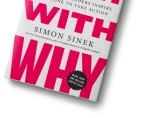
Wait! We have a special offer for you
Avail Now and get 10% on your First SOP

Our Prestigious Premium Clientele Across the Globe
and many more…
Resources for Dissertation Writing
- Getting Started
- Proposals and Prospectuses
- Literature Reviews
- Humanities and the Arts Resources
- Social/Behavioural Sciences Resources
- Sciences Resources
- Business Resources
- Formatting and Submitting Your Dissertation
- Tips: Making Progress, Staying Well, and More!
UBC Library Research Commons
About This Section of the Guide
In this section, UBC Research Commons staff have compiled a number of books available through UBC Library that might help you in your dissertation writing. In addition to the general books on this page, there are also pages with books related to writing in the Humanities and the Arts , the Social and Behavioural Sciences , the Sciences , and Business . For disciplines that fall under more than one of these broad areas, such as education or social work, we've included the books in all the broad disciplines that seem to be most appropriate.
If there's a book you've used that doesn't appear on any of these pages, please e-mail us and let us know!
General Dissertation Writing Books and E-Books
Older Books and E-Books
These books may be somewhat dated now, but can still provide useful tips for writing theses and dissertations.
- << Previous: Literature Reviews
- Next: Humanities and the Arts Resources >>
- Last Updated: Dec 16, 2024 3:34 PM
- URL: https://guides.library.ubc.ca/dissertation

- Discussions
- Reading Challenge
- Kindle Notes & Highlights
- Favorite genres
- Friends’ recommendations
- Account settings
Dissertation Writing Books

Videos Tagged “Dissertation Writing”

Welcome back. Just a moment while we sign you in to your Goodreads account.

IMAGES
COMMENTS
Jun 18, 2023 · These dissertation writing books, covering a wide range of topics from research methodology to time management and writing skills, can serve as essential tools to guide, inspire, and support PhD candidates through their journey, making the daunting task of dissertation writing more manageable and ultimately leading to successful completion and ...
Nov 26, 2014 · Other book reviews on the Whisperer. How to write a lot. BITE: recipes for remarkable research. Study skills for international postgraduates. Doing your dissertation with Microsoft Word. How to fail your Viva. Mapping your thesis. Demystifying dissertation writing. If you have a book you would like us to review, please email me.
May 17, 2023 · As an educator and budding researcher, I’ve trodden the path of academic writing more times than I can count. From my nascent days as a doctoral student to my current role guiding others through their research journeys, I’ve penned dissertations, research papers, grants, research proposals, and more – each with its unique challenges and rewarding moments of breakthrough.
Nov 18, 2010 · The appealing thing about this book is that it doesn’t try to do too much. It sticks to the mechanics of writing a basic introduction> literature review> methods> results> conclusion style thesis, but I used it to write a project based creative research thesis when I did my masters and found the advice was still valid.
5 days ago · The right books on thesis writing can be your Gandalf. For first-time thesis writers or seasoned researchers, the right resources will make it easier. In this post, we’ll explore the 5 best books on thesis writing that can make your academic journey more manageable and maybe even enjoyable. Why Do You Need The Best Books On Thesis Writing?
Dec 16, 2024 · In the fully updated Fourth Edition of their best-selling guide, Surviving Your Dissertation, Rudestam and Newton answer questions concerning every stage of the dissertation process, In addition, this guide covers topics such as the many types of quantitative and qualitative research models available, the principles of good scholarly writing, how to work with committees, how to meet IRB and ...
Aug 30, 2024 · For additional resources, including previous editions of the titles below, use QuickSearch to search for records that contain the subject keywords "dissertations academic authorship" or "academic writing." Enter either phrase in the search box (including the quotes), then use the limits at the left of the search results to restrict those ...
However, both dissertations and theses are expected to meet the same standard of originality, approaching a new area of study and contributing significantly to the universal body of knowledge (Athanasou et al., 2012). Originality is a key issue in both dissertation and thesis development and writing (Bailey, 2014; Ferguson, 2009). The ideas, the
“A Practical Guide To Modern Research:Phd Thesis And Dissertations-Planning, Writing And Vivavoce” Book Review: This book is designed to help students evaluate and overcome their research and writing weaknesses when working on dissertations. The book includes extensive coursework examples, offering detailed advice, techniques, and ...
(shelved 2 times as dissertation-writing) avg rating 3.84 — 1,546 ratings — published 1998